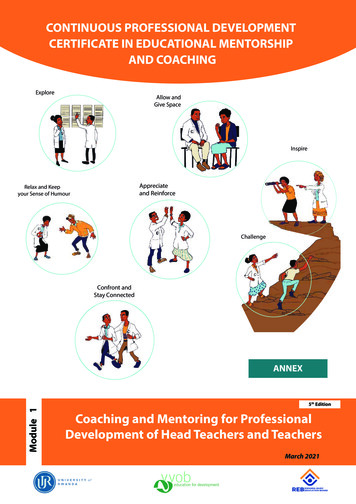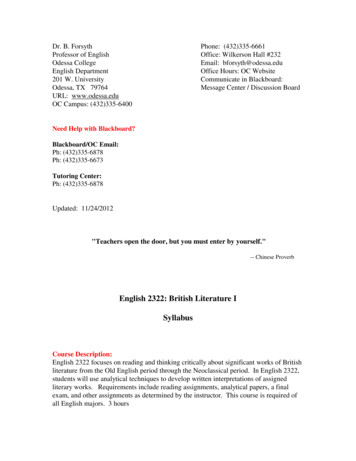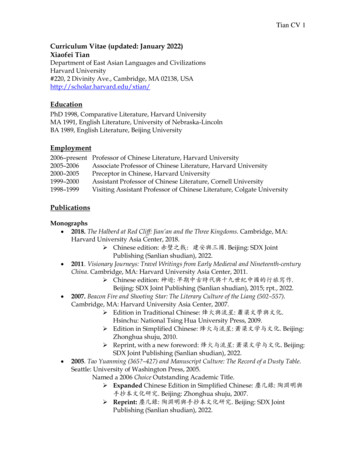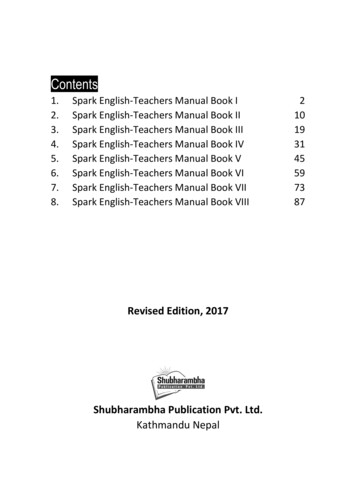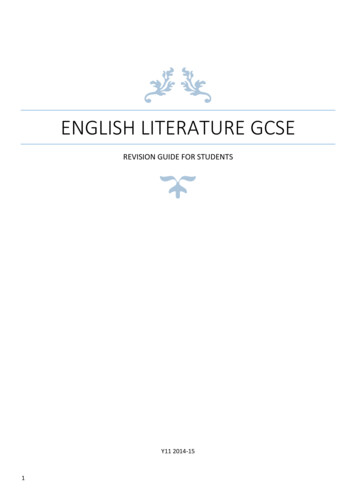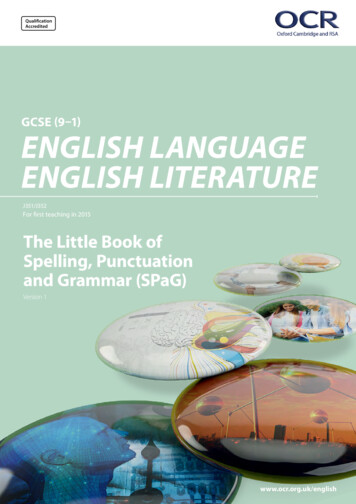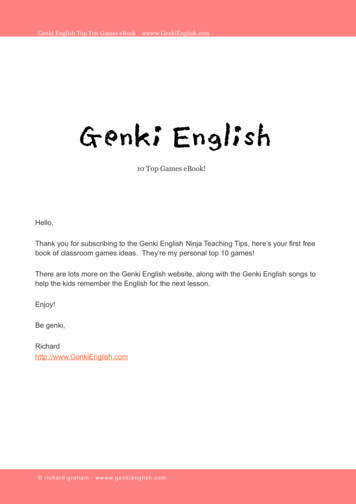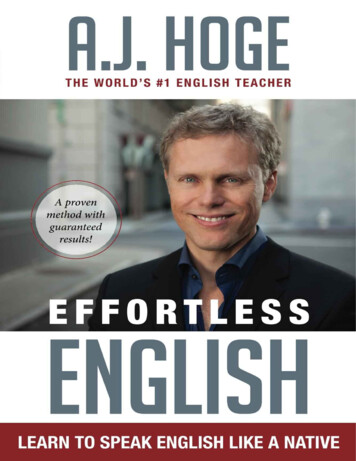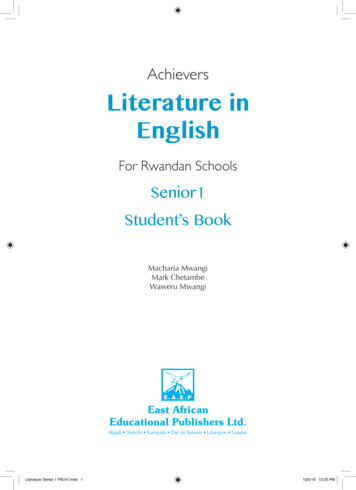
Transcription
AchieversLiterature inEnglishFor Rwandan SchoolsSenior1Student’s BookMacharia MwangiMark ChetambeWaweru MwangiKigali Nairobi Kampala Dar es Salaam Lilongwe LusakaLiterature Senior 1 PB .indd 110/5/16 12:25 PM
Published byEast African Educational Publishers Ltd.Kijabe Street, NairobiP.O. Box 45314, Nairobi – 00100, KENYATel: 254 20 2324760Mobile: 254 722 205661 / 722 207216 / 733 677716 / 734 652012Email: eaep@eastafricanpublishers.comWebsite: www.eastafricanpublishers.comEast African Publishers Rwanda Ltd.Tabs Plaza, 2nd Floor, Room No. 12. Kimironko Road,Opposite Kigali Institute of Education, KigaliP.O. Box 5151, Kigali, RWANDATel: 250 787 309702 / 722 562101Email: eaep@eastafricanpublishers.comEast African Educational Publishers also has offices or is represented in the following countries: Uganda,Tanzania, Rwanda, Malawi, Zambia, Botswana and South Sudan. Mark Chetambe, 2016First published 2016Reprinted 2016All rights reservedISBN: 978-9966-56-180-0Printed in Rwanda byPrintex LimitedLiterature Senior 1 PB .indd 210/5/16 12:25 PM
ContentsUNIT 1: Introduction to literary genres.1Definitions of literature. 1Fiction and non-fiction. 14Fiction.15Non-fiction.24UNIT 2: Introduction to prose: plot, setting and characters. 27Definition of prose. 27Aspects of prose.28Plot.28Setting.31Character and characterisation.34UNIT 3: Introduction to poetry. 48Definition of poetry.48Main features of poetry, rhythm, ryme, line length. 53Nursery rymes.56UNIT 4: Themes and messages in poetry. 60Definition of a theme. 61UNIT 5: Language use in poetry.65Repetition.65Figurative language. 66Uses of figures of speech in poetry.70UNIT 6: Introduction to drama. 73Introduction to drama. 73What is drama. 77Theatre, audience, playwright, actors, script.78Key elements of drama, act scene, stage directions, dialogue.79Literature Senior 1 PB .indd 310/5/16 12:25 PM
UNIT 7: Key aspects of drama.92Plot.92Setting.93Characters. 96Glossary. 103References. 105Literature Senior 1 PB .indd 410/5/16 12:25 PM
Unit 1Introduction toliterary genresDefinitions of literatureActivity 1Study the picture below on your own. Discuss the writing with your deskmate. What are they?Activity 2a. Discuss with your desk mate what you think literature is.b. Read the notes below as your desk mate listens. When you are through,let him or her read as you listen. Thereafter, discuss the notes with himor her.1Literature Senior 1 PB .indd 110/5/16 12:25 PM
Generally, literature refers to any written material. You may have heard peoplesay ‘I do not like the literature on the notice board’ or ‘his T-shirt has very niceliterature at the back.’ Your textbooks, school fee receipts or even the end ofterm report card can be referred to as literature.Activity 3Tell your desk mate about any novel, short story, or poem that you haveever read. What makes it different from a receipt or your end of term schoolreport card? Discuss this with your desk mate.Activity 4Read the notes below as your desk mate listens. When you are through, lethim or her read as you listen. Thereafter, discussthe notes with him or her.Literature has a more technical and specificmeaning. It refers to a kind of art, which useslanguage in a special way to comment onsociety. For example, poems and short storiesuse language in creative and artistic ways. Theymake observations and comments on humanlife and human society. Literature is an art that iscreated out of language. It refers to works of art,which appeal to our intellect. Literature appealsto our emotions in ways that make us enjoyNgugi wa Thiong’o,reading. It includes novels, poems and plays.a novelistActivity 5In groups of four, discuss why it is important to read a novel, a play or apoem.Why is literature important to us?1. Literature educates and informs us about our world. We are able tounderstand ourselves as well as other people better through readingliterary texts. Literature enables us to know about other people, placesand time periods without having to travel there physically.2Literature Senior 1 PB .indd 210/5/16 12:25 PM
2. Literature is very entertaining. Reading a literary text is a very rewardingexperience since we are able to share our emotions with the text.3. Literature satisfies and stimulates our imagination. It makes us curiousand critical thinkers who evaluate things from a deeper level and not justthe surface. Literature challenges our minds. It enables us to grow bothintellectually and socially.4. Literature helps us to understand our history and our identities better.5. Literature helps us to get an idea about other disciplines, for example,philosophy, religion, psychology, science and morality.6. Literature humanises us. It helps us to develop sensibility and compassiontowards other human beings. It helps us to appreciate what is good inhuman character and to reject what is bad. It makes us better people.7. Literature enables us to better fit in other professions. Employers in allprofessions seek employees who can express themselves creatively inspoken and written forms. These are skills which we learn by readingliterary works.Activity 6In groups of four, discuss how different African traditional literature wasfrom European literature. Which words would you use to refer to the Africantraditional literature?Literature exists in two forms: oral literature and written literature. In ourtraditional Rwandan society, we have poems, songs, proverbs, riddles, tonguetwisters and fairy tales. These are examples of oral literature. We refer to themas oral literature because they are not written in textbooks. Instead, they arecarried in the memories of members of different communities, and they arepassed down from one generation to another.The word genre refers to a kind or a category of literature. Written literaturecan be divided into three broad genres or categories: prose, poetry and drama3Literature Senior 1 PB .indd 310/5/16 12:25 PM
I was only ten years old when my sisterwas sold away. That was two years ago.A few days before, the suitors had come.Three ugly women and four men. One ofthe four men wanted to be the husbandof my sister. I disliked the way he .(From They sold my sister by Leteipa oleSunkuli)The crackby Sheikha El-MiskeryCrack the glass,And the crackWill always remain.The human heartHas veins;It’s just delicateTo the strainTOP AND BOTTOMA play by Mark M. Chetambe.Act 1Scene 2CLEOPHAS:We all heard the announcement. Cleophas willbe the Head Prefect, and Amani will be expelled.Simple. Prepare to pick your letter of expulsion. Iam very sure it is now being typed. I can feel thefingers of the secretary as she types that letter.“Dear .4Literature Senior 1 PB .indd 410/5/16 12:25 PM
Prose refers to literature which is written in continuous sentences andparagraphs. Poetry on the other hand is the kind of literature which is written inverse form. Lastly, drama is written in dialogue form. However, in all the threecategories of literature, the writers create characters who represent humanbeings that exist in human societies.Activity 7Observe the following texts on your own. In your groups of four, discuss andidentify them either as prose, drama or poetry. In each case, give reasonsfor your answer. Thereafter, you can read them and answer the questionsthat appear below each text.Text (i)I was only ten years old when my sister was sold away. That was two yearsago. A few days before, the suitors had come. Three ugly women and fourmen. One of the four men wanted to be the husband of my sister. I dislikedthe way he looked, but my father and the clan liked him very much. They saidhe came from a rich family. His father had many herds of cattle and a largeflock of sheep.It was true they were rich. They brought as many gifts as I had never seenbefore. They brought beer; the local busaa and the other type sold in bottles.It was called Libuma. They brought four thick blankets. One for my father, onefor my mother, one for my uncle and one for my aunt. Nothing was broughtfor us children. In fact, they did not want children in the house where mysister was sold. I hid myself behind a standing bag of maize. They could notsee me. They thought that I was playing with the other children outside. I saw with my own eyes. I saw the father of my sister’s husband-to-be pull outa wad of red hundred-shilling notes. He gave them to my father. My father’shands quaked as he took the money. My mother smiled. I rubbed my weteyes. They sold my sister.(From They sold my sister by Leteipa ole Sunkuli)Practice Exercise 1a. From the above excerpt, make a list of the characters.b. What actions show that the adults were unfair to the children?c. In one sentence, summarise what happens in this excerpt.5Literature Senior 1 PB .indd 510/5/16 12:25 PM
Text (ii)An African ThunderstormDavid RubadiriFrom the westClouds come hurrying with the windTurning sharplyHere and thereLike a plague of locustsWhirling,Tossing up things on its tailLike a madman chasing nothing.Pregnant cloudsRide stately on its back,Gathering to perch on hillsLike sinister dark wings;The wind whistles byAnd trees bend to let it pass.In the villageScreams of delighted children,Toss and turnIn the din of the whirling wind,Women,Babies clinging on their backsDart aboutIn and outMadly;The wind whistles byWhilst trees bend to let it pass.Clothes wave like tattered flagsFlying offTo expose dangling breastsAs jagged blinding flashes6Literature Senior 1 PB .indd 610/5/16 12:25 PM
Rumble, tremble and crackAmidst the smell of fired smokeAnd the pelting march of the storm.Practice Exercise 2a. With your desk mate, discuss what is causing the commotion?b. With your desk mate, discuss and explain where these events are takingplace.c. In groups of four, identify the phrases, which begin with the word ‘like’.Discuss in your group, why you think they have been used.Text (iii)(Silence as the curtains rise. Sounds of cutlery only. Mr Bwenbya occasionallyclears his throat. Ian has his earphones on. Lisa looks tense whilst Linda isoblivious to all the tension.)MR BWEMBYA: So did everyone have a good day?LINDA:Yes! The rehearsal went really well!LISA:That’s really nice Linda. Keep up the good work.LINDA:Mrs Afumba says I’ll definitely win the best actress award!She says that I act very well as a rich man’s girlfriend.IAN:(mumbling) Because you have a living example in thishouse.MR BWEMBYA: what did you say ian?IAN:Nothing.LINDA:So Mummy, I need new clothes for the play because thereare three different scenes and I must have an outfit for eachscene. Mrs Afumba insists that I must look like an expensivehigh-class woman because I am the girlfriend of a very richman. May I go shopping tomorrow Mummy?LISA:Yes, we can, if Father gives us money. Maybe we can getIan those sports shoes he’s wanted for so long.MR BWEMBYA: Let’s buy Linda’s clothes first since she needs them for theplay soon and then we can buy Ian’s shoes later.IAN:(mumbling) Of course. Ian’s needs are not that important!Did you say something young man?(Silence)7Literature Senior 1 PB .indd 710/5/16 12:25 PM
MR BWEMBYA: So what about you Ian? Were you chosen to play in theschool’s rugby team?(Silence)MR BWEMBYA: (shouting) Ian, I am talking to you! Will you answer me!IAN:What?MR BWEMBYA: I asked you a question.IAN:(looking defiant) What?LISA:Ian! You cannot speak to your father like that!IAN:And you cannot speak to me like that! You are not mymother.MR BWEMBYA: Ian! Apologise to your mother right this minute!IAN:She’s not my mother. In case you have forgotten, mymother was packed out of this house and sent off to livein the village because of the girlfriend of a very rich man!In fact, I think I shall go live with my mother and leave thishouse to the girlfriend of a very rich man and her daughter.(Ian walks off from the dinner table.)MR BWEMBYA: Ian! Come back this minute! Ian !(The family feud by Razwana Kimutai)Practice Exercise 3a. From the excerpt above, you have noticed that some words are inbrackets. What do you think is the purpose of these phrases? Discuss thisin your group.b. What seems to be the problem in this family? Discuss this in your group.c. Do you think Ian behaved well? Discuss this in your group.d. In groups of four, discuss the message from this excerpt.Activity 8Dramatize this excerpt in your class.8Literature Senior 1 PB .indd 810/5/16 12:25 PM
Practice Exercise 4a. From the examples of prose, poetry and drama above, what differencescan you identify between the three genres of literature? Discuss in groupsof four and present your answers to the rest of the class.b. Select a passage from any newspaper and discuss whether it is fiction ornon-fiction.Activity 9Below is an extract from Chinua Achebe’s novel, A Man of the People. Theauthor mixes direct speech (dialogue) with narration. Read it on your own.Chief Koko, a fat jovial man wearing an enormous home-knitted red-andyellow sweater was about to have coffee. He asked if we would join him orhave some alcohol.‘I no follow you black white-men for drink tea and coffee in the hotafternoon,’ said Chief Nanga. ‘Whisky and soda for me and for Mr. Samalu.’Chief Koko explained that nothing warmed the belly like hot coffee andproceeded to take a loud and long sip followed by a satisfied Ahh! Then hepractically dropped the cup and saucer on the drinks table by his chair andjumped up as though a scorpion had stung him.‘They have killed me,’ he wailed, wringing his hands, breathing hard andloud and rolling his eyes. Chief Nanga and I sprang up in alarm and askedtogether what had happened. But our host kept crying that they had killedhim and they could now go and celebrate.‘What is it, S.I.?’ asked Chief Nanga, putting an arm around the other’s neck.‘They have poisoned my coffee,’ he said, and broke down completely.Meanwhile the steward, hearing his master’s cry, had rushed in.‘Who poisoned my coffee?’ he asked. ‘Not me‑o!’‘Call the cook!’ thundered the Minister. ‘Call him here. I will kill him beforeI die. Go and bring him.’The steward dashed out again and soon returned to say the cook hadgone out. The Minister slumped into his chair and began to groan and holdhis stomach. Then his bodyguard whom we had seen dressed like a cowboyhurried in from the front gate, and hearing what had happened dashed outat full speed to try and catch the cook.9Literature Senior 1 PB .indd 910/5/16 12:25 PM
‘Let’s go and call a doctor,’ I said.‘That’s right,’ said Chief Nanga with relief and, leaving his friend, rushedtowards the telephone. I hadn’t thought about the telephone.Practice Exercise 5a. In your words, write a definition of the word literature.b. Although dialogue is used primarily in drama, the excerpt above showsthat it is also used in fictional prose. Examine the dialogue in this excerptand suggest its function.c. Working in groups, dramatise the events in this extract as if it is a piece ofdrama.Some types of literary genres: fairy tale, novel, autobiography, tragedyA fairy tale is an imagined traditional story, which contains elements of fantasyor make-belief. In other words, the events in a fairy tale do not happen in the realworld but they happen in the world of fantasy.10Literature Senior 1 PB .indd 1010/5/16 12:25 PM
Activity 10Below is an example of a fairy tale from Rwanda. Read it carefully and thenrespond to the questions after it.There was a man, named Magorwa, who looked after his sheep and cultivatedhis fields. One day, while he was taking his sheep to graze, he noted that arabbit in the bush had eaten some of his crops. When he came back the nextday, the same small creature had eaten more of his crops. He took the rabbitback home and said, “I’m going to have to slaughter you for eating my crops.”The rabbit said, “Wait; please don’t eat me. Forgive me and I will not eatyour crops anymore.”Magorwa had a good heart; he forgave Rabbit and let him go.On his way back to the field the next day, Magorwa was approached byLion. Lion told him that he had to kill one of the sheep in the field and give itto him. Magorwa was scared and did as he was told. He went and killed oneof his sheep and gave it to Lion. This kept happening day after day.One day, on his way to his field, Magorwa met Rabbit. Rabbit said, “I seethat you have less and less sheep. What has happened?”Magorwa replied, “Lion comes every day and makes me give it one of mysheep. Now I have just a few of them left.”The little animal he had saved said, “The next time Lion comes I will be nextto you, hidden in a bush. I will tell you what to say.”Magorwa took his sheep to the grasses and Lion once again came from theforest and told him it was time for him to give him another one of his flock.However, Magorwa said he would not give him any more. Rabbit was hiddennext to Magorwa and spoke out loudly.“Who are you talking to?” asked Lion.Rabbit said loudly, “I am the king of heaven and earth who puts on the skinof lions.”“Who is that?” asked Lion.“What are you looking for?” shouted Rabbit, hidden behind the bush.Lion was scared and said, “I . I’m just looking for firewood.”“Sit down and don’t move!” shouted Rabbit, who then whispered toMagorwa to get the firewood rope and tie the hands and legs of Lion.That is how Magorwa captured and killed the big ferocious Lion and savedhis sheep, with the help of the little vegetable eating animal he had forgiven.11Literature Senior 1 PB .indd 1110/5/16 12:25 PM
Practice Exercise 6a. What elements of this story belong to fantasy rather than reality?b. What lesson can you draw from this story?c. What evidence is there in this story that the community from which thestory originates practices crop farming and animal husbandry?d. Rabbit is intelligent while Lion is cruel and foolish. Do you agree with thisdescription?e. The animals in this story represent human values. What lessons can wedraw from the behaviour of the small animal and the big animal?f. Think of any fairy tale you know and narrate it to your class in turns.A novel is a long piece of narrative fiction. Chinua Achebe’s A Man of thePeople is a good example of a novel. Animal Farm by George Orwell is anotherexample of a novel, which you will encounter soon. Which other novels have youcome across?An autobiography is an example of what is called non-fiction prose. This is a kind ofprose that presents facts about a person’s life but uses the style of fiction writing.In other words, the person’s life is presented as a credible, interesting story withcharacters, setting and dialogue. A good example of an autobiography is NelsonMandela’s No Easy Walk to Freedom. Do you know any other autobiography? Anautobiography is someone’s life story written by the person himself or herself. Abiography is someone’s life story written by someone else.Below is an excerpt from Bill Clinton’s autobiography.Early on the morning of August 1946, I was born under a clear sky. This was aftera violent summer storm. I was born to a widowed mother in the Julia ChesterHospital in Hope. This is a town of about six thousand in south-west Arkansas. Itis thirty-three miles east of the Texas boarder at Texarkana. My mother namedme William Jefferson Blythe III after my father, William Jefferson Blythe Jr. Myfather was one of the nine children of a poor farmer in Sherman, Texas, whodied when my father was seventeen.12Literature Senior 1 PB .indd 1210/5/16 12:25 PM
According to his sisters, my father alwaystried to take care of them. He grew up to be ahandsome, hardworking, fun-loving man. He metmy mother at Tri-State Hospital in Shreveport,Louisiana, in 1943. She was training to be a nurse.Many times when I was growing up, I askedMother to tell me the story of their meeting,courting, and marriage.My father had brought a girlfriend with somekind of medical emergency into the ward whereshe was working. They talked and flirted whilethe other woman was being treated. On his wayout of the hospital, he touched the finger onwhich she was wearing her boyfriend’s ring and asked her if she was married.She stammered “no” she was single. The next day he sent the other womanflowers and her heart sank. Then he called Mother for a date, explaining thathe always sent flowers when he ended a relationship.Two months later, they were married and he was off to war. He served in amotor pool in the invasion of Italy, repairing jeeps and tanks. After the war,he returned to Hope for Mother and they moved to Chicago, where he gothis old job as a salesman for the Manbee Equipment Company. They bought alittle house in the suburb of Forest Park. However, they couldn’t move in fora couple of months. Since Mother was pregnant with me, they decided sheshould go home to Hope until they could get into the new house. On May,17th, 1946, after moving their furniture into their new home, my father wasdriving from Chicago to Hope to fetch his wife.Late at night on Highway Sixty outside of Sikeston Missouri. He lost controlof his car, a 1942 Buick, when the right front tire blew out on a wet road. Hewas thrown clear of the car and landed in, or crawled onto, a drainage ditch.The ditch held three feet of water. When he was found, after a two hoursearch, his hand was grasping a branch above the waterline. He had triedbut failed to save himself. He drowned. He was only twenty-eight years old,married two years and eight months. He spent only seven months of the twoyears with Mother.(Adapted from My Life, by Bill Clinton)13Literature Senior 1 PB .indd 1310/5/16 12:25 PM
Practice Exercise 7a. Bill Clinton is a former President of the United States of America. In thisexcerpt, we learn that his father died at an early age. How did his father die?b. What was Bill Clinton’s original name?c. What was Bill Clinton’s mother’s occupation?d. Bill Clinton’s father had an interesting way of ending a relationship. Explainbriefly how he used to do it.e. Autobiographies are highly personal in their tone. What details in thisexcerpt suggest that the author wants to reveal the deepest details of hislife?A tragedy is a kind of drama in which a heroic protagonist encounters a crisis andfalls from grace to grass. Usually, tragedies involve serious events, and possiblydeath, especially the death of the main character. A good example of a tragedyis the play Oedipus the King, by an ancient Greek playwright called Sophocles.Another example of a tragedy is William Shakespeare’s play called Othello. Doyou know of any other tragic play?Fiction and non-fictionActivity 11Discuss in groups the difference between fiction and non-fiction.Characteristics of fictional and non-fictional literary worksProse can be further divided into fictional and non-fictional prose. Fictionalworks of art are imagined, or they originate in the mind of the writer. Forinstance, when you write a short story, a novella or a novel, you will createcharacters and places that do not necessarily exist in real life. On the otherhand, non-fictional works are based on true accounts of people, events andplaces. Examples of non-fictional works are biographies, autobiographies,essays and articles. These are based on the lives of real people existing in realplaces.14Literature Senior 1 PB .indd 1410/5/16 12:25 PM
Activity 12HomeworkThe two extracts below are examples of fiction and non-fiction. Read themon your own, your spare time. Discuss the differences between them withmembers of your group.FictionMorrison Okoli (1955-2010)by Jekwu AnyaegbunaMorrison, my brother. You came in fifty-five and left at fifty-five. What acoincidence! The coffin has killed you. So this is the end of it all, Morrison.I warned you, didn’t I? But you lied to me that everybody in America kept acoffin as household property for preserving valuables – things you do notwant others to see. I could not argue with you because you resisted my pointof view, saying I was rustic. I sealed up my mouth. After all, our people saya traveller is more knowledgeable than a white-haired old man sitting on anarmchair. It’s true I have never travelled beyond the map of Nigeria. I don’teven have an international passport, to start with.At the airport, customs were worried about the empty coffin you carried.When they opened it, they did not see a corpse. They saw dollars, and theirfaces migrated from sympathies to smiles. They rubbed their palms likestarving squirrels, and flaunted their coconut teeth like precious stonesplugged to their gums. They knocked on their stomachs. They were hungry.But you did not understand until I told you what they meant. Did I say it withmy mouth? No, I didn’t. I clicked my fingers, and you understood the soundand sign with your quick American brain. When you handed some crisp dollarbills to them, they let us go. They did not see the narcotics buried underneaththe dollars. They did not even bother to check. If they had checked and foundout, there could not have been any problems because a kilogram or twohanded to them would have made them happier, and of course richer.We are at the cemetery. Military cemetery. Jehoshaphat is here with us. Youtold us to address the dog as a fine gentleman. We’ve been doing that eversince. He has been wagging his tail around your coffin, and we do not knowwhat to tell him. Nobody is educated enough to speak American English to15Literature Senior 1 PB .indd 1510/5/16 12:25 PM
him, to tell him that you are dead, that you’re now the one inside the coffin.Those things you used to tell him are very difficult to say with our own typeof stiff tongues accustomed to our heavy Nigerian English: Hey c’mon, darling.Ovurrr here, ovurrr there.When I asked you years ago to marry a woman, you told me that you weremarried to Jehoshaphat and had a marriage certificate issued for the union. Idid not understand, but you made it clear to me. ‘Jehoshaphat is a dog,’ yousaid. A beautiful bulldog. Born and raised in Ohio. Women should be kept oninvitations, you said. To kiss and let go. Never for a permanent keep. Thatwas what Adam did to Eve after they ate the ominous apple. You argued, hekissed her on a bunch of green leaves on a cold winter morning, and then hewent into the bush to hunt, and he never returned to her any more.Now there is no woman to cry for you. It is always an honour to havewomen cry during someone’s burial, but yours is too silent for comfort. Noone is going to shave their hair to mourn your death. Nobody is going to bewidowed. No children rendered fatherless. I cannot hire mourners for you;my civil service salary has no provision for that, although I managed to bribeone of the cemetery priests working here, to pray for your Americanised,non-transferable soul. If we died the way we came, I would have to diefirst because I am your elder brother, and I imagined your death would bemore ceremonial than this, with expensive obituaries on radio and televisionannouncing your departure. Or is it easy to acquire American citizenship witha valid green card? How many Nigerians can achieve that without engaging ina dehumanising job or a ruse in America? Well, I cannot outline the jobs here,but I understand that there are some jobs in America that turn a man intoa breastfeeding nanny. I am afraid to tell you that we will kill Jehoshaphatany moment now and destroy the marriage certificate since we cannot keepeither. He does not recognise any of us; he doesn’t even consider us humansworthy of his plays. We will give him a befitting burial; I can assure you ofthat. We will ensure that his grave sits very close to yours.
Like a madman chasing nothing. Pregnant clouds Ride stately on its back, Gathering to perch on hills Like sinister dark wings; The wind whistles by And trees bend to let it pass. In the village Screams of delighted children, Toss and turn In the din of the whirling wind, Women, Babies cli

